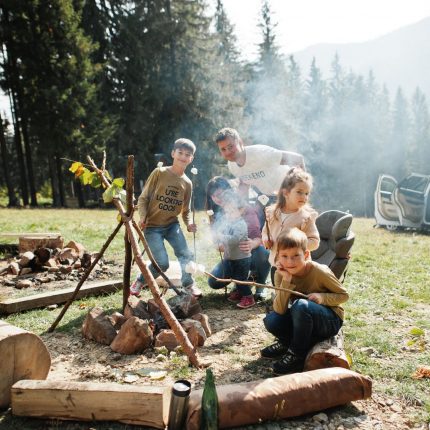
Free Science Resources to Supplement Your Homeschool
April 24, 2020Science is a fascinating subject for many people. It is full of explosive experiments, incredible observations, and plentiful answers for everyday questions. Though the study of science can be complex and advanced, there are numerous opportunities for applicable, fun, and exciting projects and lessons and activities for kids. Homeschooling families can especially explore this often mind-blowing topic by incorporating it in their daily schedule with experiments, living books, virtual field trips, YouTube videos, and more.
However, as fun as projects can be, sometimes, science feels a bit costly. On-site field trips often require a large group admission, and science curricula may require additional purchases for kits and supplies to offer a complete study. Further, quality scientific tools like microscopes and telescopes do not come cheap.
Even if you’re not a budget homeschooler, it is always helpful to find free resources to supplement your course of study. Thankfully, there are plenty of online science resources for homeschooling parents! Home education has come a long way from even a decade ago. With some research, you can find high-quality supplemental resources such as informational websites, games, worksheets, videos, tours, lessons, and interactive modules!
Helpful Supplemental Science Activities for Kids and for Homeschool Families
One of the advantages of science is that it can be as hands-on as you want. Science is a wonderful topic for all learning styles, as it can be applied effectively to each. While many people view science as an incredibly structured and complicated subject, it can be adapted to many situations and opportunities for flexible learning. For example, visual learners can utilize videos and experiments, tactile learners can succeed with project-based learning, auditory learners can listen to recordings, videos, and provide verbal reports.
Additionally, science adapts well to all homeschooling methods. Even if you are eclectic homeschoolers preferring a mixture of methods, you can incorporate science to fit! Whether your students learn from online lessons, textbooks, with a homeschool co-op class or even a community college course, science is one of the rare subjects that can meet every platform with success. If you are just getting started homeschooling due to a mid-year switch or school closures, you’re likely somewhat overwhelmed with decisions and stress. Finally, finances may be strained. We understand, and most of us have been there ourselves. To help, here are several FREE science resources for your homeschool!
- Citizen Science Opportunities. With these crazy fun experiments, homeschooling science is far from boring! Need a fun science fair project? One of these science experiments would be perfect! Read on to find out about people-powered research and how to use it for homeschooling science.
- Science Buddies. This website is a treasure trove of science resources, activities, and games for kids! You’ll find free lessons, videos, real science news, and more!
- Homeschool High School for Free: Science. High school science is probably one of the most intimidating for homeschool parents. It is more advanced, complex, and most often requires kits and labs. However, it doesn’t have to be expensive! Here’s how to supplement your high school science curriculum for free.
- NASA Kids’ Club. If your kids want to learn more about the space program, NASA is the obvious choice for educational resources. However, even better, NASA has its own Kids’ Club for playing educational games and learning more about NASA itself. Do you have a future astronaut on your hands? This is a great place for them to start!
- SciShow Kids. YouTube is an excellent learning tool for students, especially visual and auditory learners. This channel is great for learning about all kinds of scientific topics, broken down, and entertaining for kids!
- Science Unit Study Collection. One of the best ways to experience science is with unit studies! A unit study looks at a topic from all angles with deep research, projects, writing assignments, and historical context. This collection of unit studies will show you how to create units of study for four popular branches of science: astronomy, chemistry, nuclear science, and geology!
- National Geographic for Kids. National Geographic has always been a credible educational resource. Beyond their normal resources, though, they now have a website just for kids! Children have their choice between videos, games, interactive programs, and more.
- Living Book Lists for Homeschool Science Study. As with literature, living books are a great choice for a unit of study. Living books teach through the narrative to keep students engaged and excited. If living books are new to you, consider this article for how to include them in your homeschool.
- Science Kids. This website is a powerhouse of scientific information! Here, you can find experiments, topics, quizzes, games, facts, and more.
- Free Science Experiment Journal. Make your science experiments easier with this printable journal! Your student can read about the scientific process and utilize various pages to record everything they need: a materials list, a bibliography page, lab journal pages, and more!
- Frontiers for Young Minds. This is an open-access scientific journal by real scientists, created just for kids! The website offers awesome scientific articles spanning numerous informational topics, and kids can participate by reviewing content pieces!
- Amazing Space. This is a wonderful resource for kids to learn more about astronomy! With various topics, ranging from gravity, black holes, comets, extrasolar planets, the solar system, and more, your children have several learning opportunities available.
- Climate Kids. Another great NASA resource! This site is specifically to help kids learn about weather systems, climate change, energy, carbon, and more!
- My First Garden. One of the best ways to learn is through hands-on opportunities! Gardening is a wonderful idea for teaching children about plant growth cycles. With this website, your kids can learn about keeping their first garden!
- STEAM Powered Family. If you are looking for STEM/STEAM projects for your homeschoolers, look no further. This website has tons of project ideas and resources!
- Exploratorium. This educational website offers activities, exhibits, blogs, videos, and more for kids to learn about all kinds of topics! Study space, biology, chemistry, earth science, engineering, physics, and more! This is a mother lode of educational options.
- Weather Wiz Kids. A fun website by a meteorologist! Kids can discover fascinating science facts, learn about all kinds of weather, natural disasters, and try fun experiments! There is even a “Kid’s Corner” tab!
- Smithsonian Science Education Center. The Smithsonian is a fantastic educational resource for everyone, and this science education center website is especially great for kids. Explore all kinds of topics about science with videos, eBooks, curricula, apps, and more.
Top 10 Homeschool Science Curriculum Options
As you are getting started homeschooling, you’ll be researching curriculum options and comparing them. There are nearly innumerable options in the homeschool market, however, not all curricula are created equal and some are breathtakingly expensive. Even seasoned homeschoolers are often overwhelmed between the options as they look for a new year of curriculum. Because it can be incredibly difficult to narrow down choices, we’d like to offer our Resource Guide as your first step. This is a curriculum directory with filters for styles, formats, subjects, age, and more.
However, if you get overwhelmed with decisions, sometimes it is helpful to simply read a list of top selections and go from there. In the list below, you’ll find some of our favorite brands for homeschool science. These have ranked high in both our 2020 Top 100 Educational Resources and our 2019 Back to Homeschool Curriculum Awards! While not all of these curricula are free, they are solid educational choices. Best wishes!
- Smart Science Education
- Supercharged Science
- Khan Academy
- Apologia Science
- Time4Learning
- Easy Peasy Homeschool: Science
- Quest Clubs
- Pandia Press
- Science for High School
- Ocean First Education
Courtney Newman
Courtney Newman is a homeschooled graduate with a love for writing. She is currently pursuing her undergraduate degree in Health Science at University of the People. Other than writing, her hobbies include reading, yoga, visiting the beach, and meditating. She lives with her husband and pets in coastal Virginia.
Latest Posts

As homeschooling continues to grow in popularity, more parents are taking on the challenge of providing a comprehensive education that not only meets academic standards but also prepares their…
Read more >
June has come and gone, and summer is in full swing! Whether you're traveling this summer or staying close to home, we hope you're enjoying this time with your family. We wanted this month's…
Read more >
Summer is an all-around favorite season for most people. In the U.S., it’s even more exciting for many of us since we get to celebrate Independence Day! The Fourth of July is a wonderful…
Read more >

